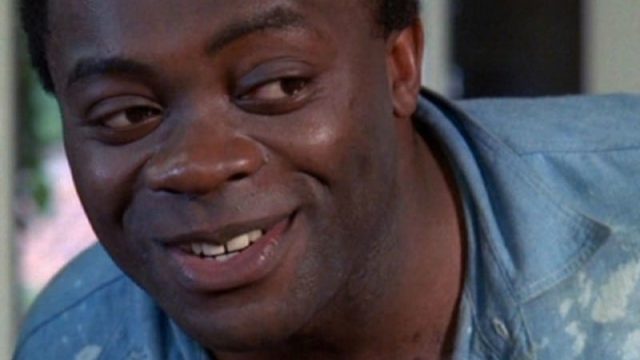Larry Cohen’s 1972 Bone is incisive, funny, moving, and brutal. It’s the kind of shameless exploitation film that some people quite reasonably might not have the stomach or patience for, but it has a kind of diamond-in-the-rough brilliance. Great film. Very hard to recommend in casual conversation.
The late, great Yaphet Kotto plays Bone, who–with a kind of electric, amused intensity–takes a white couple hostage in their own home and demands they pay him off. He picked Bill (Andrew Duggan) and Bernadette (Joyce Van Patten) because their McMansion seems like a guarantee of money, but he soon discovers, to his disappointment, that they’re living beyond their means. They’re also so mired in their own resentment of each other that Bone is less a hostage-taker and more one of the hapless dinner guests in Who’s Afraid of Virginia Woolf? He sends Bill off to empty his bank account, giving him an ultimatum: if he’s not back in an hour, Bone will rape and murder Bernadette.
Cohen doesn’t dance around the fact that a lot of the movie hinges on the threat of Black-on-white sexual violence; he wasn’t really known for dancing around anything, and even in this, his first movie, his style already feels fully formed. He’s a trash auteur, not an edgelord hack; he’s not invoking this dangerous racist boogeyman out of the belief that it constitutes shock value. He skewers it from multiple angles at once, playing it straight, reversing it, defanging it, and turning it inside-out to look at the seams. He looks at how Bone leverages Bill and Bernadette’s fear of him–how he uses the perception of Blackness, how he perceives it, how he perceives the white supremacy all around him, and how he perceives himself. I can understand how someone might consider this part of the story a deal-breaker, plain and simple, but I think Cohen and Kotto make it into legitimate art as well as exploitation. They don’t elevate this pernicious trope (it’s likely beyond all possibility of elevation anyway); they dig into it and mine it for everything it can possibly say about society and these specific people.
Once Bill leaves the house, the movie kicks into another gear and starts going to stranger, riskier places. Bone and Bernadette mill around the house, talking and drinking–stuck with each other and too human to ignore their mutual unhappiness and eccentricity. Bernadette reflexively plays hostess. Bone can’t help being drawn into conversation. They lapse into a kind of meandering, start-and-stop intimacy that, with each passing minute, makes their connection more complicated.
Meanwhile, Bill … lets it go. Both he and Bernadette reflexively use Bone as a kind of tool or convenient force of nature, something they can use in their favor in their long cold war against each other. And if Bill simply fails to pick up the money and instead lets himself be dragged into someone else’s bed and someone else’s story, well … he wouldn’t mind coming home to find that the wife he can’t afford to divorce has been murdered. Bernadette likewise starts plotting to team up with Bone to kill Bill (vol. 3?) and split the insurance money.
The plot is slippery but well-paced, with some great jolts and reveals, but the real pleasures of Bone are its performances and its structure. The structure doesn’t feel cinematic–it’s more like a poem or a piece of music, with a focus on phrases and ideas coming back as reprises, often in an unsettling minor key. It’s especially effective in Bernadette’s final monologue, but it’s powerful throughout.
As far as the performances go, Kotto is excellent in the kind of front-and-center role he hardly ever got, and he gives us a kaleidoscopic portrayal of Bone, from “consciously terrifying” to “guarded” to “angry” to “bullshitting” to “philosophical” to “vulnerable.” He goes from evoking white fears to confirming Black ones. Duggan has a perfect scumbag vibe, his psychological landscape rendered as a series of fake ads for his used car lot, his lack of shame so total that he strips a haunting story of sexual assault for parts and reuses dialogue from it to try to save his own ass. Jeannie Berlin appears in an unforgettable unnamed role, a kind of violently and heartrendingly deconstructed Manic Pixie Dream Girl; she’s a serious scene-stealer. For a while, Patten has the weakest, most conventional role–the constantly drinking housewife, bored and lonely and frightened and horny–but when the ending hits, she becomes an absolutely tour de force. Bone is good throughout, but its ending is the kind that leaves you sitting there feeling absolutely stunned.
The fact that this is now on the Criterion Channel has me hoping that there could be a Criterion release for it in the not-so-distant future. It would make a superb addition to the collection.
Bone is streaming on the Criterion Channel and Tubi.


